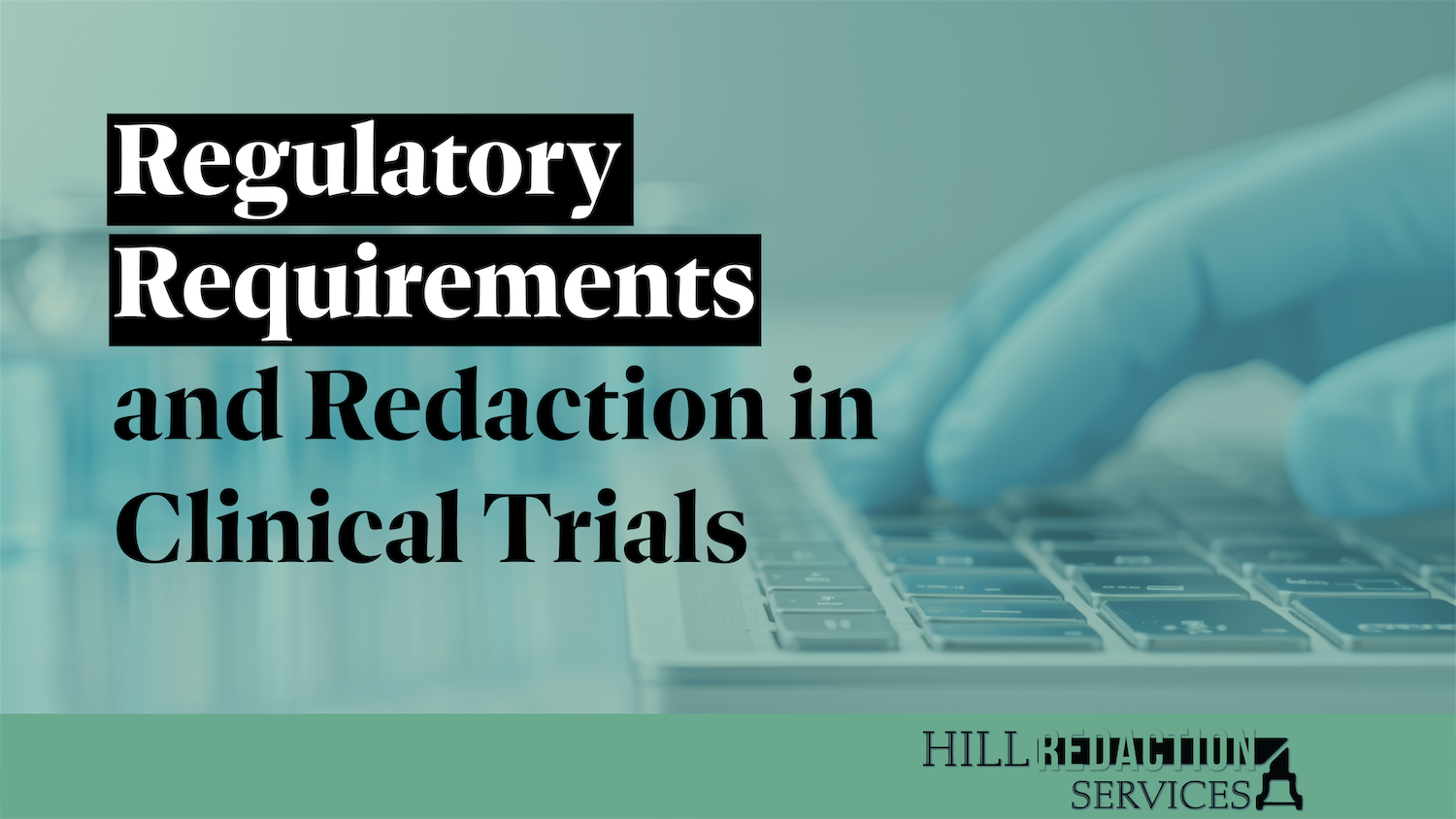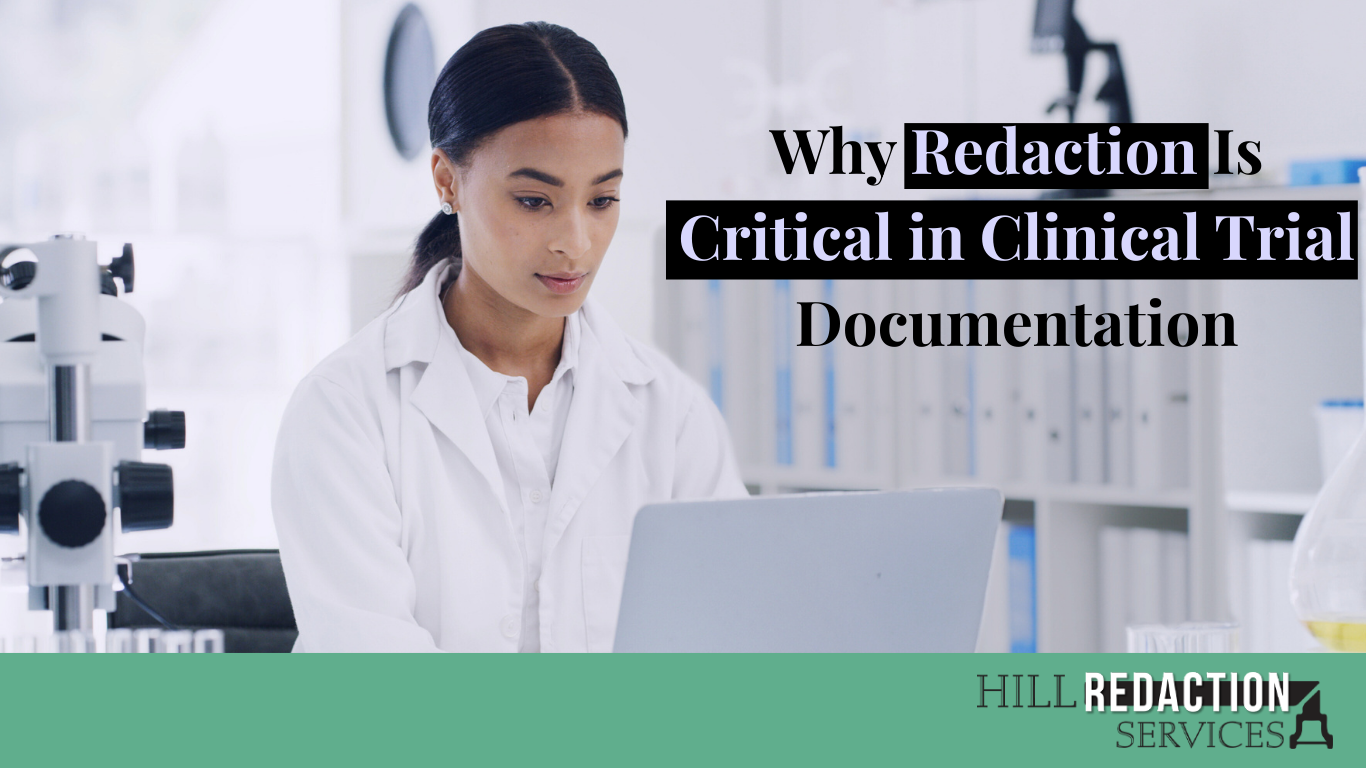
Regulatory Requirements and Redaction in Clinical Trials: A Must-Know Guide
Ever wondered how to keep patient data under wraps while adhering to the intricate web of clinical trial regulations? It’s a balancing act, but fear not. We’ve got your back.
This guide breaks down everything you need to know about regulatory requirements and redaction in clinical trials. We’ll cover:
- An overview of global regulations (FDA, EMA, ICH) on data redaction
- How regulations vary across regions and what that means for you
If you’re looking for an expert hand to handle your clinical trial redaction needs, Hill Redaction Services offers top-notch solutions tailored specifically for your industry. Let us take the weight off your shoulders.
Global Regulations
When it comes to clinical trials, patient privacy is non-negotiable. It’s like a superhero’s secret identity, and redaction is the trusty mask protecting it. But, there’s a whole world of regulations surrounding this crucial process. Let’s talk about the big three:
FDA: The American Watchdog
The U.S. Food and Drug Administration (FDA) is the gatekeeper of redaction in American clinical trials. Their Code of Federal Regulations (CFR) Title 21, Parts 312, 314, and 812 hold the key to understanding what needs to be masked.
What to Redact?
- Personally Identifiable Information (PII): Names, addresses, phone numbers…anything that could link the data back to a specific individual.
- Protected Health Information (PHI): Think medical records, treatment details, even insurance information.
- Commercial Confidential Information: This one’s for the companies. It includes trade secrets, financial data, and anything else that gives them a competitive edge.
EMA: The European Guardian
Across the pond, the European Medicines Agency (EMA) is in charge. They’ve got their own set of guidelines in the form of the European Clinical Trials Regulation (EU) No 536/2014 and ICH guidelines.
EMA’s Focus
While similar to the FDA, the EMA puts a stronger emphasis on:
- Data Minimization: Collect only the absolutely necessary information, and redact the rest.
- Pseudonymization: Replacing PII with pseudonyms to make it harder to identify individuals.
ICH: The International Harmonizer
The International Council for Harmonisation of Technical Requirements for Pharmaceuticals for Human Use (ICH) is like the United Nations of drug regulation. They create guidelines that many countries adopt, including the U.S. and EU members. The ICH E6(R2) guideline is the go-to source for redaction standards.
Pro Tip: These are just the highlights. Always consult the specific regulations that apply to your clinical trial to ensure compliance.
Regional Differences in Regulations
You might be thinking, “Great, now I get the big picture, but what about the specifics?” Well, hold on to your hats because redaction regulations aren’t one-size-fits-all. They vary from region to region, and it’s crucial to know the nuances to stay compliant.
U.S. vs. EU
While both the FDA and EMA share the goal of protecting patient privacy, their approaches differ in subtle yet important ways:
- Risk Tolerance: The U.S. tends to be more risk-averse, often requiring stricter redaction standards compared to the EU.
- Data Sharing: The EU is generally more open to data sharing for research purposes, but they also have stronger data protection laws in place (think GDPR).
Beyond the U.S. and EU
Redaction requirements can vary wildly beyond these two major players. Some countries have very strict rules, while others have more lenient ones. If your clinical trial is global, it’s more complex. Each country has its own unique set of regulations, and failing to comply can result in serious consequences.
For example:
- In Japan, personal identification codes are considered highly sensitive and require additional layers of protection.
- China has strict regulations on cross-border data transfer, which can impact how you handle redaction in multinational trials.
Why It Matters to You
So, why should you care about these regional differences? Well, for starters, non-compliance can lead to:
- Regulatory fines: These can be hefty and put a dent in your research budget.
- Delayed approvals: Your clinical trial might get stuck in the regulatory process, costing you valuable time and resources.
- Reputational damage: Failing to protect patient privacy can erode trust and harm your organization’s image.
Managing the intricacies of these regulations can feel daunting, but don’t worry. There are solutions out there to help you stay on the right side of the law.
Redaction Roadblocks? Hill Redaction Services is Here to Help
- Global regulations (FDA, EMA, ICH) provide the framework for data redaction.
- Regional differences in regulations require careful attention to detail.
- Non-compliance can lead to fines, delays, and damage to your reputation.
Feeling a bit overwhelmed? Redaction doesn’t have to be a headache. Let Hill Redaction Services handle the heavy lifting. Our team of experts is well-versed in the ever-changing landscape of global regulations, ensuring your clinical trial data stays compliant and confidential.
Related Posts

Regulatory Requirements and Redaction in Clinical Trials: A Must-Know Guide
Ever wondered how to keep patient data under wraps while adhering to the intricate web of clinical trial regulations? It’s a balancing act, but fear not. We’ve got your back.
This guide breaks down everything you need to know about regulatory requirements and redaction in clinical trials. We’ll cover:
- An overview of global regulations (FDA, EMA, ICH) on data redaction
- How regulations vary across regions and what that means for you
If you’re looking for an expert hand to handle your clinical trial redaction needs, Hill Redaction Services offers top-notch solutions tailored specifically for your industry. Let us take the weight off your shoulders.
Global Regulations
When it comes to clinical trials, patient privacy is non-negotiable. It’s like a superhero’s secret identity, and redaction is the trusty mask protecting it. But, there’s a whole world of regulations surrounding this crucial process. Let’s talk about the big three:
FDA: The American Watchdog
The U.S. Food and Drug Administration (FDA) is the gatekeeper of redaction in American clinical trials. Their Code of Federal Regulations (CFR) Title 21, Parts 312, 314, and 812 hold the key to understanding what needs to be masked.
What to Redact?
- Personally Identifiable Information (PII): Names, addresses, phone numbers…anything that could link the data back to a specific individual.
- Protected Health Information (PHI): Think medical records, treatment details, even insurance information.
- Commercial Confidential Information: This one’s for the companies. It includes trade secrets, financial data, and anything else that gives them a competitive edge.
EMA: The European Guardian
Across the pond, the European Medicines Agency (EMA) is in charge. They’ve got their own set of guidelines in the form of the European Clinical Trials Regulation (EU) No 536/2014 and ICH guidelines.
EMA’s Focus
While similar to the FDA, the EMA puts a stronger emphasis on:
- Data Minimization: Collect only the absolutely necessary information, and redact the rest.
- Pseudonymization: Replacing PII with pseudonyms to make it harder to identify individuals.
ICH: The International Harmonizer
The International Council for Harmonisation of Technical Requirements for Pharmaceuticals for Human Use (ICH) is like the United Nations of drug regulation. They create guidelines that many countries adopt, including the U.S. and EU members. The ICH E6(R2) guideline is the go-to source for redaction standards.
Pro Tip: These are just the highlights. Always consult the specific regulations that apply to your clinical trial to ensure compliance.
Regional Differences in Regulations
You might be thinking, “Great, now I get the big picture, but what about the specifics?” Well, hold on to your hats because redaction regulations aren’t one-size-fits-all. They vary from region to region, and it’s crucial to know the nuances to stay compliant.
U.S. vs. EU
While both the FDA and EMA share the goal of protecting patient privacy, their approaches differ in subtle yet important ways:
- Risk Tolerance: The U.S. tends to be more risk-averse, often requiring stricter redaction standards compared to the EU.
- Data Sharing: The EU is generally more open to data sharing for research purposes, but they also have stronger data protection laws in place (think GDPR).
Beyond the U.S. and EU
Redaction requirements can vary wildly beyond these two major players. Some countries have very strict rules, while others have more lenient ones. If your clinical trial is global, it’s more complex. Each country has its own unique set of regulations, and failing to comply can result in serious consequences.
For example:
- In Japan, personal identification codes are considered highly sensitive and require additional layers of protection.
- China has strict regulations on cross-border data transfer, which can impact how you handle redaction in multinational trials.
Why It Matters to You
So, why should you care about these regional differences? Well, for starters, non-compliance can lead to:
- Regulatory fines: These can be hefty and put a dent in your research budget.
- Delayed approvals: Your clinical trial might get stuck in the regulatory process, costing you valuable time and resources.
- Reputational damage: Failing to protect patient privacy can erode trust and harm your organization’s image.
Managing the intricacies of these regulations can feel daunting, but don’t worry. There are solutions out there to help you stay on the right side of the law.
Redaction Roadblocks? Hill Redaction Services is Here to Help
- Global regulations (FDA, EMA, ICH) provide the framework for data redaction.
- Regional differences in regulations require careful attention to detail.
- Non-compliance can lead to fines, delays, and damage to your reputation.
Feeling a bit overwhelmed? Redaction doesn’t have to be a headache. Let Hill Redaction Services handle the heavy lifting. Our team of experts is well-versed in the ever-changing landscape of global regulations, ensuring your clinical trial data stays compliant and confidential.





